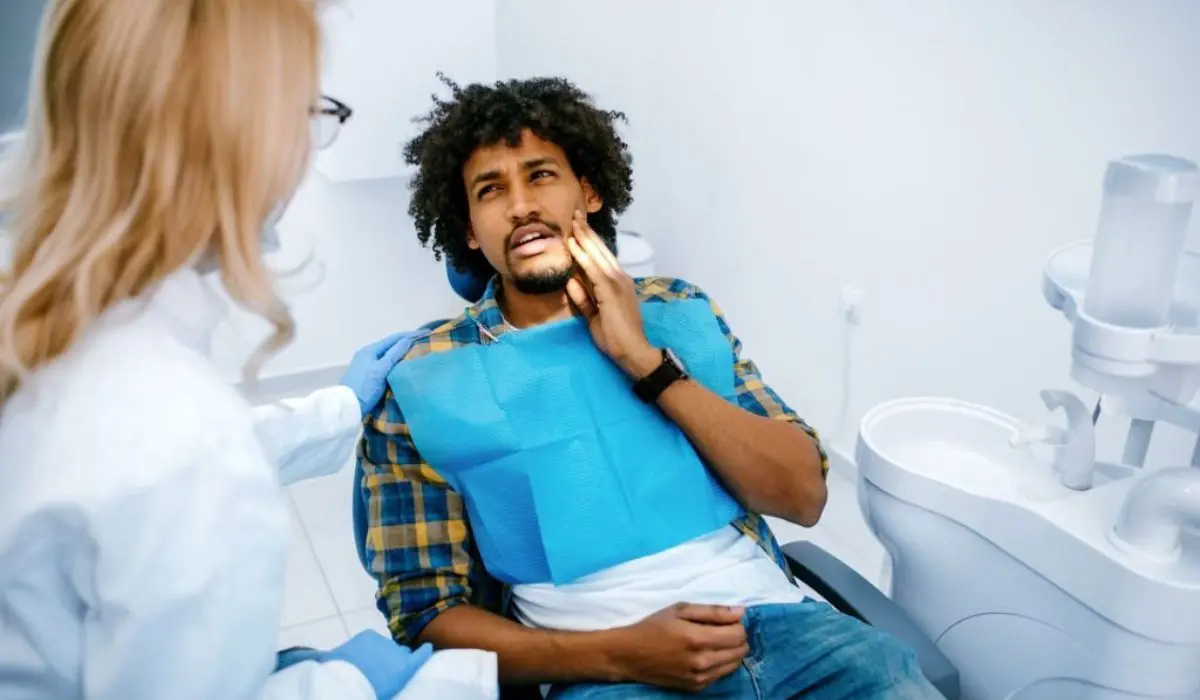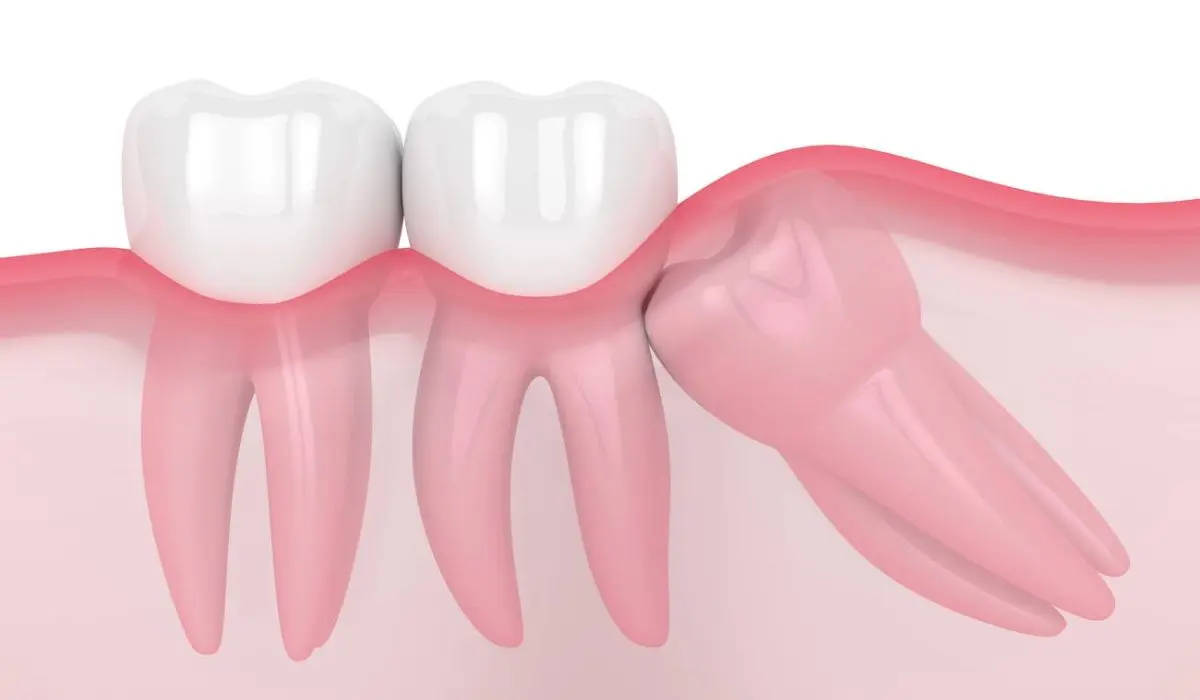Health
Impacted Teeth: Symptoms, Causes, Treatment, And Pain Relief

Get ready for a wild ride – impacted teeth! This dental condition can cause swelling, tenderness, and pain, making eating and speaking uncomfortable. But, understanding the symptoms, causes, and treatments is key to managing this issue successfully.
Impacted teeth occur when a tooth doesn’t fully erupt from the gum line and gets stuck. Reasons for this may include insufficient jaw space or abnormal growth.
What Are Impacted Teeth?
Impacted teeth refer to a tooth that is unable to erupt properly. This occurs when there is not enough space for the tooth to grow in its normal position. It usually affects the 3rd molars, otherwise known as wisdom teeth, but can also affect other teeth.

Impacted teeth may remain trapped within the jawbone or partially come out of the gum line. This can lead to pain, swelling, infection, and damage to the surrounding teeth. It can also cause overcrowding of the existing teeth or misaligning of the dental arch.
The causes of impacted teeth are varied. A small jaw structure or too much crowding of the other teeth may be to blame. Abnormal positioning of teeth and abnormal growth patterns may also contribute. Additionally, genes and hereditary conditions may increase the chances of impacted teeth.
Impacted teeth have been a source of discomfort for many cultures and societies in history. In the past, extraction methods were crude and primitive. Now, dentists and oral surgeons use modern techniques to diagnose and treat this dental issue with options tailored to the individual.
Types Of Impacted Teeth
Let’s zoom in on the various impacted teeth. Mandibular impacted canines, also called “eye teeth,” are stuck beneath the gums of the lower jaw. This is a common issue and may need orthodontic care. Maxillary impacted canines are similar, but occur in the upper jaw.
- Mandibular Impacted Canines: Eye teeth caught beneath gums
- Maxillary Impacted Canines: Upper jaw’s canine teeth
Impacted molars can also happen. Wisdom teeth often don’t have space to emerge correctly, and if left untreated they can cause pain, infection, and damage to other teeth.
Symptoms Of Impacted Teeth
? Pain and discomfort
Impacted teeth can cause swelling and tenderness in the affected area. This can lead to pain radiating to the jaw, ear, and even the head. And if one tries to bite or chew on the impacted tooth, then the pain increases, making it hard to eat or talk.
Headaches or migraines may also be felt due to the pressure from the impacted tooth. If left untreated, the discomfort may worsen, leading to more problems.
? Swelling and inflammation
Swelling and inflammation can worsen over time if untreated. This can cause more severe pain and make it hard to eat or speak properly. It’s important to seek dental care if you feel these symptoms. Dental supplements can be tried.
Signs of impacted teeth include jaw pain, trouble opening your mouth, bad breath, and an unpleasant taste. These vary depending on the location and severity of the impaction.
? Difficulty in chewing or biting
Imagine you’re sitting down to enjoy a yummy meal, but suddenly you struggle to chew or bite. This could be a sign of impacted teeth; when teeth don’t fully emerge from the gums.
Impacted teeth can cause difficulty in chewing or biting. Misalignment of the tooth presses against other teeth, making it hard to bring both upper and lower jaws together. Pain from the impacted tooth can also make it tough to chew.
Causes Of Impacted Teeth
To understand the causes of impacted teeth, delve into the realm of genetics and family history, dental overcrowding, and abnormal tooth development.
These factors play a significant role in the development of impacted teeth, providing valuable insights into potential causes and paving the way for effective treatment options and pain relief.
▪️ Genetics and family history
Impacted teeth can come from genetics and family history. Genes we get from our parents can affect how our teeth develop leading to impaction. If one or both parents had impacted teeth, you might too.
▪️ Abnormal tooth development
To better understand abnormal tooth growth, let’s explore the key factors. Genetics, environmental conditions, mechanical obstructions, and oral habits can all contribute. It’s essential to consult a dental professional for an accurate diagnosis.
Treatment Options For Impacted Teeth
To determine the appropriate treatment options for impacted teeth, consider watchful waiting, orthodontic treatment, and surgical extraction.
Each solution addresses the unique challenges posed by impacted teeth, offering various approaches to alleviate symptoms, correct misalignment, and ultimately restore oral health and function.
➔ Orthodontic treatment
Orthodontic treatment is a complex process that involves different components. Some of these include braces, retainers, Invisalign, and spacers. Plus, other specialized techniques may need to be used depending on the individual’s needs.
For instance, jaw expansion devices or headgear can be used for more complex cases. It is important to make sure the dentist or orthodontist is qualified to diagnose and treat tooth misalignment and malocclusion.
➔ Surgical extraction
If you’re wondering about surgical extraction, here’s a 3-step guide to help you understand the process.
- Evaluation: Your dentist will examine your teeth, gums, and jaw before performing the procedure. They may take X-rays or use other imaging techniques to get a better view of the tooth’s position and its relationship with nearby structures.
- Anesthesia and Incision: On the day of the surgery, you’ll receive either local or general anesthesia to make the process more comfortable. After you’re numb, the oral surgeon will make an incision in the gum tissue to access the impacted tooth and bone.
- Tooth Removal: Specialized instruments will be used to remove any bone-blocking access to the tooth. The surgeon may wiggle it until it loosens or break it into smaller pieces. Then they’ll clean the extraction site and close it with sutures if needed.
➔ Pain Relief For Impacted Teeth
To find relief from impacted teeth pain, turn to effective solutions like over-the-counter pain medications, local anesthetics, and numbing gels, as well as cold compresses and warm saltwater rinses. These sub-sections provide different approaches to alleviate the discomfort caused by impacted teeth.
- Over-the-counter pain medications
- Local anesthetics and numbing gels
- Cold compresses and warm saltwater rinses
Conclusion:
We have looked at impacted teeth – symptoms, causes, treatments, and relief. We know a lot about it. But, each case is different. It’s best to talk to a dentist for personal advice.
Now, let’s look at some unique things not mentioned. If left untreated, impacted teeth can cause infections and hurt nearby teeth. So, it’s important to find and treat it early.
To stay healthy and avoid complications from impacted teeth, it’s important to go to the dentist regularly. Dental professionals can spot signs of impaction and provide treatment. Taking action can stop future pain and keep your mouth healthy.
